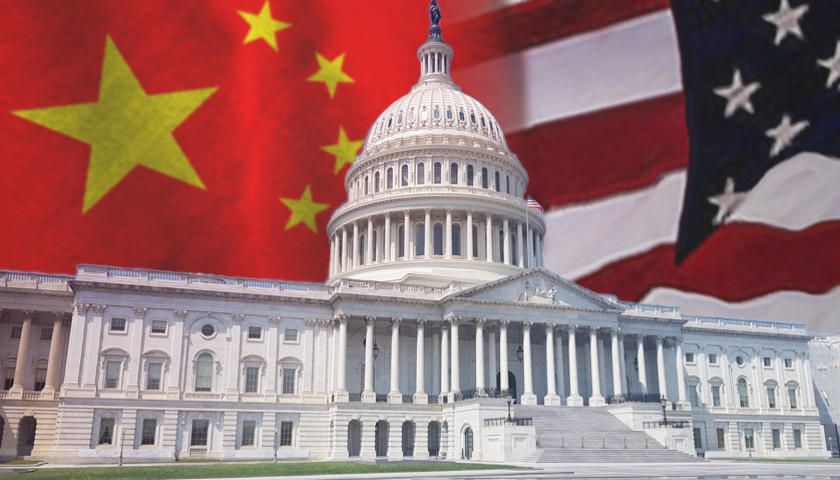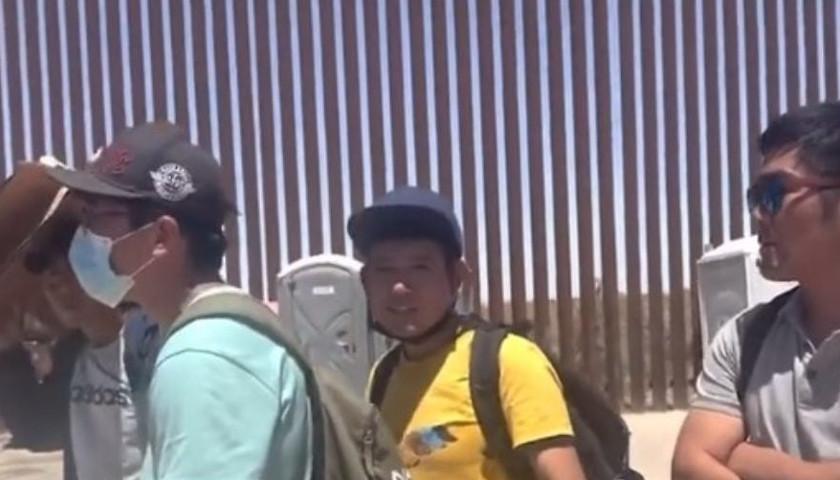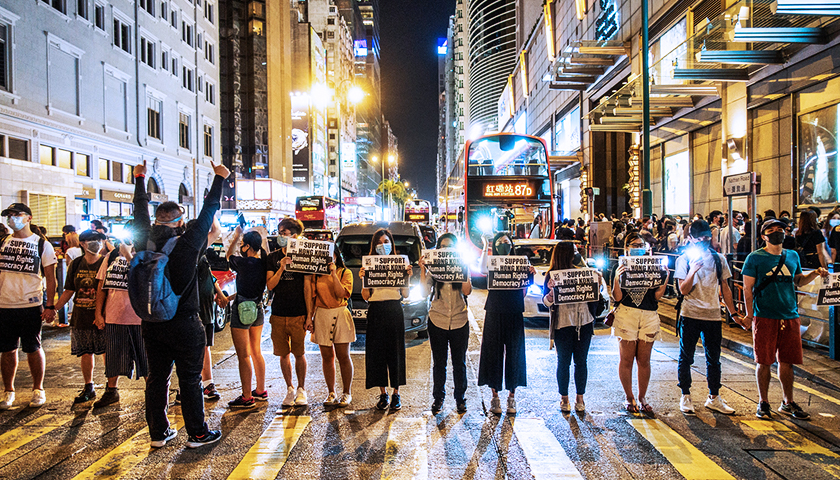by Robert S. Spalding and Zachary Glanz
From Nixon’s visit to China in 1972 to Deng Xiaoping’s sweeping economic reforms, the United States assumed that capital success, American investment, and expansion of diplomatic relations inevitably would lead to a democratized China that embraced the United States. This folly has produced a growing adversarial threat posed by a rising, ambitious superpower.
With Xi Jinping’s rise to power in 2013, he made clear that despite China’s transformation into an economic superpower with unparalleled growth, the Chinese Communist Party’s pursuit to exert authoritarian control, advanced by enhanced technological prowess, will remain unwavering.
To continue the notion that further investment and economic relations would contribute to reducing the CCP’s ideologies is to once again repeat the mistakes that let China prosper without democratic commitments in the first place.
Unfortunately, most of U.S. academia espouses this false belief. An open letter in the Washington Post to President Trump, titled “China is not an enemy,” downplays China’s growth as a military power, questions the U.S. presence in the South Pacific, and expresses a lack of concern for China’s exploitation of American economic cooperation.
John Pomfret, also at the Washington Post explains that these scholars “deny agency to the Chinese Communist Party by placing the bulk of the blame for the current crisis in U.S.-China relations at the feet of the Trump administration.” In doing so, they have generated praise from China’s Foreign Ministry and the China Daily while reserving their critique for what has been a positive change in American foreign policy.
As Pomfret notes, China’s end to “market-oriented market reforms,” its persecution and relocation of Uighur Muslims to detention camps, cybertheft, undermining of Taiwanese democracy, and the imposition of autocracy on Hong Kong illustrates that the majority of responsibility in a deterioration of U.S.-Chinese relations should be credited to China.
Although both Chinese provocation and historic lessons prove soft-power diplomacy has failed, leading China experts still advocate on behalf of the talking point that “China is not an enemy.”
Despite Xi Jinping’s clearly articulated philosophy, as laid out in his “Document 9,” against free speech, freedom of the press, and constitutional democracy, the standard academic view persists that greater assertion in combating Chinese authoritarianism and expansion of soft power would harm American interests.
To place greater blame on the United States while downplaying China’s antagonistic behavior is concerning and should be met with scrutiny – to say the least.
Propaganda Has Its Privileges
According to Isaac Stone Fish, Beijing maintains a whitelist that “rewards academics, scholars and business people who spoke positively about the U.S.-China relationship, promoted engagement and overlooked Chinese human rights abuses” with incentives including visas. Those who signed the open letter would be viewed favorably within the context of the whitelist, and some have already received visas.
Pursuing diplomatic relations with China, in contrast to hostile alternatives, may be warranted. Given Chinese and American economic interdependence, and unparalleled military capabilities, capitalizing on diplomacy may be the best approach.
Dovish discourse can provide insight and enhance U.S. lawmakers’ ability to debate and maintain economic relations, as well as combat military expansion and authoritarian governance. The diplomatic pursuit can only be valid, however, when those who support it act in the name of American interests.
Unfortunately for American academia, the co-signers of the open letter are acting in the pursuit of self-interest.
The primary co-signers of the open letter include M. Taylor Fravel, Michael D. Swaine, J. Stapleton Roy, Ezra Vogel, and Susan A. Thornton. Swaine coordinates the U.S.-China Crisis Management Program co-sponsored by the Carnegie Endowment and the China Foundation for International and Strategic Studies (CFISS). He also co-authored Managing Sino-American Crises: Case Studies and Analysis with Zhang Tuosheng, chairman of the CFISS academic committee and director of its foreign policy center.
CFISS is primarily funded by the People’s Liberation Army of China, and mostly staffed by PLA colonels and generals. The organization is responsible for conducting defense research on behalf of the PLA and the Chinese ministry of foreign affairs. As a senior fellow of the Carnegie Endowment for International Peace, Swaine’s influence on American foreign policy is amplified. In order to maintain his strong relations with CFISS and the U.S.-China Crisis Management Program, it is in Swaine’s best interest to downplay and defuse righteous U.S. hostility towards China’s violation of human rights, cybertheft, and responsibility in the American trade deficit.
Evidence of Chinese entities funding American think tanks has recently surfaced as well. Tung Chee-hwa is the vice chairman of the National Committee of the Chinese People’s Political Consultative Conference (CPPCC), in addition to being the chairman of the China-United States Exchange Foundation, which is registered as a foreign agent in the United States. He has secured partnerships and provided funding for think tanks such as the Carnegie Endowment. Both the United Front Work Department funding of the Carnegie Endowment and Carnegie’s partnership with CFISS provide sufficient evidence that Swaine’s support for the open letter is guided primarily by self-interest.
Stapleton Roy, founding director emeritus of the Kissinger Institute on China and the United States, also displays self-interest in his endorsement of the open letter. As a former director and board advisor of the copper mining company Freeport-McMoRan, Roy was compensated with $377,572 in 2006. This included 17,713 shares of the company beneficially owned, 7,713 shares of which are not subject to options while 10,000 shares are subject to options.
Although Freeport-McMoRan is not directly affiliated with Chinese entities, copper prices are currently falling as a result of pressure produced by the U.S.-China trade war. Denouncing the trade war in the open letter would thus grant Roy the opportunity to lobby for a company from which he will profit when the trade war calms.
Roy also retired in 2008 as a board member from ConocoPhillips, an oil drilling company that has received favorable treatment in China. In 1981, the Chinese government awarded Phillips Petroleum Company access to the South China Sea Pearl River Mouth Basin, assisting the government with oil exploration. ConocoPhillips was the first foreign operator to make an offshore discovery and it has worked closely with the Chinese government to develop oil fields for the last 37 years. Moreover, Roy is a trustee of the Carnegie Endowment for International Peace.
Agents of Influence?
Susan A. Thornton, former State Department diplomat and acting assistant secretary for East Asian and Pacific Affairs, is similarly subject to the influence of Chinese soft power. Now she is a senior fellow and research scholar at Yale University’s Paul Tsai China Center – named for the late Dr. Paul Tsai, after his son Joe Tsai, co-founder and vice-chairman of Alibaba, donated $30 million to the university. Alibaba is one of China’s most valuable companies, and as a result, it is further scrutinized by the Chinese Communist Party. Recently, the CCP dispatched officials to Alibaba to “foster communication and help businesses carry forward key projects.” Joe Tsai has also publicly supported the Chinese Communist Party, first when he denounced Houston Rockets general manager Daryl Morey’s support of Hong Kong protestors, and secondly when he renounced his Taiwanese identity, instead boasting of his Chinese identity.
Primary examples of Thornton’s direct interference in our combating of CCP ambitions include her opposition to the FBI arresting four Chinese Ministry of State Security officials who illegally pressured Chinese dissident Guo Wengui, a businessman who exposed corruption within Communist Chinese leadership. She also “worked during interagency meetings to prevent the White House from imposing reciprocal restrictions on Chinese embassy construction in retaliation for China for blocking the importation of parts into China needed for repairs at the U.S. Embassy in Beijing.”
Further instances of China-pandering include removing the flag of Taiwan from the websites of the U.S. Trade Representative and the State Department’s Bureau of Consular Affairs. Thornton also fiercely opposed the approval of a marketing license that would enable American companies to support Taiwan’s Submarine program. Thornton has authored columns in Chinese state-sponsored media outlets such as Caixin, and has participated in Beijing-sponsored events by the Chinese Academy of Social Sciences, which is affiliated with the PRC’s China State Council.
Ezra Vogel is currently the professor emeritus at the Fairbank Center for Chinese Research of Harvard and former director of the Fairbank Center for East Asian Research. Founder John K. Fairbank established theories that, although later abandoned, laid the foundation for U.S. academic research supporting the Chinese government. Fairbank’s beliefs contributed to his success in encouraging the United States to abandon diplomatic ties with Taiwan and initiate relations with the CCP. Vogel, as the second director of the Fairbank Center, is responsible for the continuation of academic research sympathetic to Chinese activity.
Harvard is also subject to Chinese Communist Party influence. Most recently, Dr. Charles Lieber, chairman of the university’s chemistry and chemical biology department, was arrested for failing to disclose his participation as “a strategic scientist” at Wuhan University of Technology from 2012 to 2017. Lieber was a participant in China’s “Thousand Talents” program, for which he received $50,000 per month and established his own lab at the university in Wuhan. Vogel has received positive media reception from state-owned media outlets such as Xinhua, in which he compliments China’s economic progress alongside other academics who praise the Communist Party.
Selling Out America
Despite the prominence of the primary co-signers of the Washington Post open letter, suspicion also arises from the lesser-known, minor co-signers. The long list includes Liu Yawei, the younger brother of Liu Yazhou, a retired general of the Chinese PLA Air Force. Liu Yazhou’s father-in-law was Li Xiannian, former president of the People’s Republic of China.
Although academic support for reducing hostilities between the United States and China through diplomatic means and academic relations is within reason, the open letter is endorsed under the guise of defending American interests. Self-interested blaming of the United States for hostile relations, negligence of China’s human rights violations, and aggressive military expansion have provided the co-signers of the letter the opportunity to once again win the Chinese Communist Party’s favor and cement themselves as willingly silent or intentionally blind to the CCP’s malignant intentions.
From the NBA to Marriott, the sentiment expressed in the open letter reflects a poor response to mounting Chinese pressure. Bowing to CCP pressure will result in further expansion of Chinese soft power.
Getting placed on a visa whitelist in exchange for publishing pro-Chinese propaganda in a prominent U.S. newspaper isn’t merely a sell-out of the authors’ personal integrity – it’s an assault on U.S. national interests. For too long, American companies, politicians, and academics have caved to this pressure, and the trend will continue as long as CCP-influenced academic rhetoric does as well.
– – –
Brig. Gen. Robert S. Spalding (USAF Ret.), is a senior fellow at the Hudson Institute, focusing on U.S.-China relations, economic and national security.
Zachary Glanz is a student at the University of Massachusetts Amherst pursuing degrees in Mandarin Chinese, Arabic and Middle Eastern Studies.





